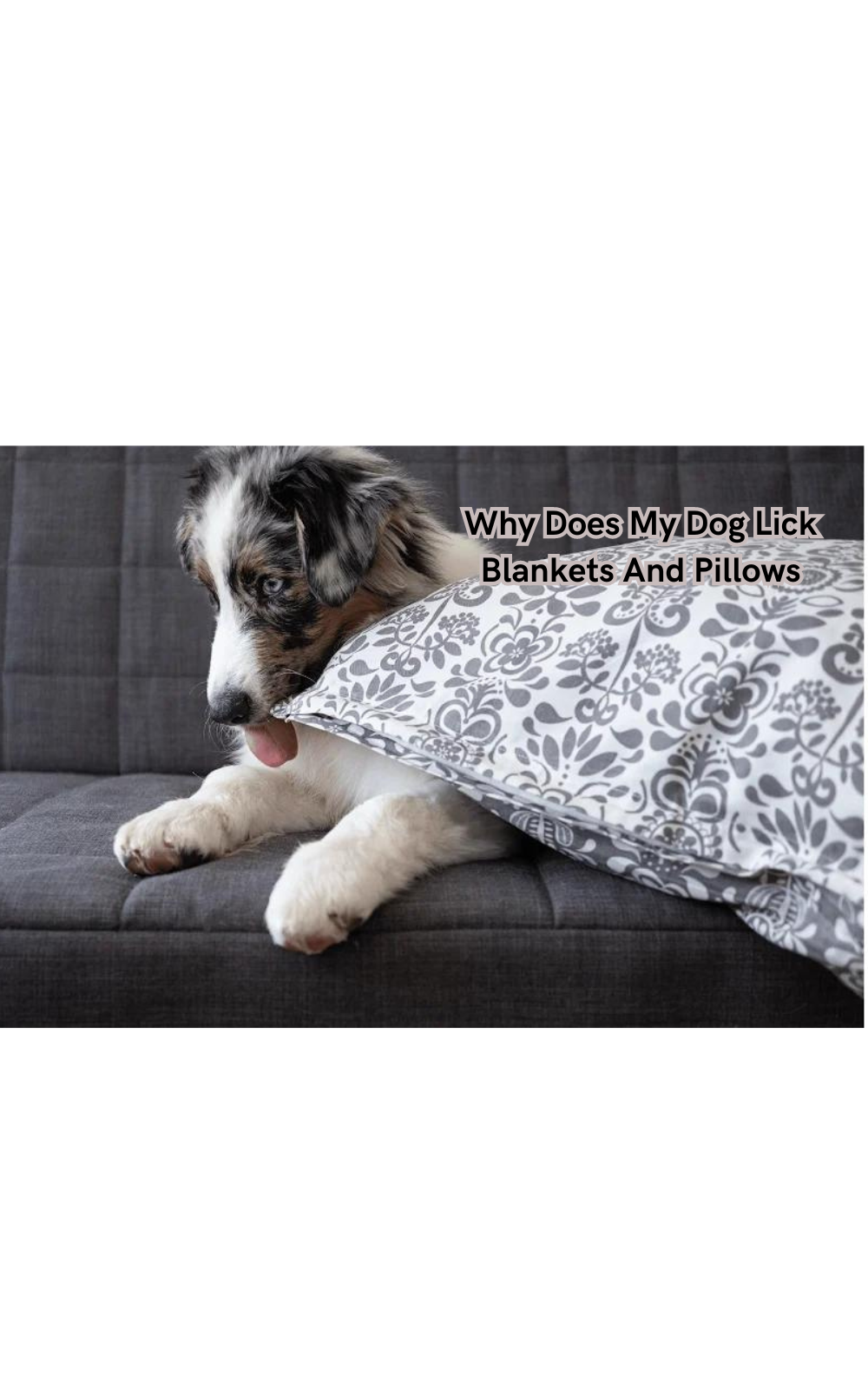Why Does My Dog Lick Blankets And Pillows
In this article, we will explore the possible reasons behind this behavior and what you can do to address it.

Dogs are known to be one of the most loving and loyal companions, always there to make us smile and give us unconditional love. However, they also have some quirky behaviors that may leave us scratching our heads in confusion. One such behavior is licking blankets and pillows.
While it may seem like a strange or even annoying habit, there can actually be several reasons why dogs lick blankets and pillows. In this article, we will explore the possible reasons behind this behavior and what you can do to address it.
So, if you have ever wondered why your furry friend can't seem to resist licking your cozy blankets and fluffy pillows, keep reading to find out more.
Possible Reasons Why Dogs Lick Blankets And Pillows
There are various reasons why dogs may engage in licking blankets and pillows. Some of these reasons may be instinctual, while others may be a result of learned behavior or underlying health issues. Here are some possible explanations for this peculiar habit:
Grooming Behavior
One of the main reasons why dogs lick blankets and pillows is due to their natural grooming behavior. Licking helps dogs keep themselves clean, as it removes dirt and debris from their fur. This instinctual behavior is also a way for dogs to show affection towards their owners or other members of their pack.
So, if your dog is constantly licking your blankets and pillows, it could be their way of trying to keep them clean and free from any unwanted scents. While this behavior may seem harmless, it can become excessive or obsessive in some dogs, which may require intervention from a professional trainer or veterinarian.
In addition, some dogs may also lick blankets and pillows as a form of self-soothing or stress relief, especially if they are feeling anxious or insecure. It's important to observe your dog's body language and seek guidance from a professional if you suspect this behavior is due to underlying anxiety or stress.
Comfort or Soothing
Dogs are creatures of comfort, and they often seek out soft and cozy surfaces to relax on. Licking blankets and pillows may be a way for them to mark their territory and claim these items as their own. It can also be a self-soothing behavior that helps them feel calm and secure.
If your dog is constantly licking blankets and pillows, it may be a sign that they are feeling anxious or stressed. Providing them with a comfortable and safe space to retreat to can help reduce their need for excessive licking.
Additionally, some dogs may engage in this behavior as a result of separation anxiety or boredom. It's important to address these underlying issues and provide your dog with plenty of mental and physical stimulation to keep them happy and content.
Anxiety or Stress
Anxiety and stress can manifest in various ways for dogs, and licking objects is one of them. If your dog has a history of anxiety or fear, they may turn to blankets and pillows as a source of comfort. This behavior can also be triggered by changes in their environment or routine.
If you notice that your dog's licking behavior increases during stressful situations, it's important to address the root cause and provide them with the support they need. This may include creating a safe and calm environment for them, using calming aids such as pheromone diffusers or seeking guidance from a professional trainer or behaviorist.
Nutritional Deficiencies
In some cases, dogs may lick blankets and pillows due to nutritional deficiencies. If their diet lacks essential nutrients or if they have a medical condition that affects their absorption of nutrients, they may turn to non-food items for supplementation.
Providing your dog with a balanced and nutritious diet is crucial for their overall health and well-being. Consult with your veterinarian if you suspect that your dog's licking behavior is due to a nutritional deficiency. They may recommend dietary changes or supplements to help address any deficiencies and reduce the likelihood of compulsive licking.
Medical Conditions
Excessive licking can also be a sign of underlying medical conditions such as allergies, digestive issues, or pain. If your dog is constantly licking blankets and pillows, it's important to rule out any potential health issues.
Consult with your veterinarian and provide them with a detailed history of your dog's behavior. They may recommend further testing or treatment if necessary.
So, while licking blankets and pillows may seem like a strange or annoying habit, it's important to understand that there can be several reasons behind this behavior. By addressing any underlying issues and providing your dog with proper care and attention, you can help them lead a happy and healthy life without the need for excess licking.
Is it Harmful?
In most cases, licking blankets and pillows is not harmful to dogs. However, excessive or compulsive licking can lead to skin irritation and discomfort, as well as potential ingestion of fibers or dyes from the items being licked.
If you notice your dog engaging in this behavior excessively, it's important to address it and seek professional guidance. The underlying cause may be a behavioral issue, anxiety or stress, or an undiagnosed medical condition that could potentially harm your dog's health.
It's always best to monitor your dog's behavior and consult with a professional if you have any concerns about their well-being. By addressing the root cause of their licking behavior, you can ensure that they lead a happy and healthy life.
How to Stop the Behavior?
Stopping a dog from licking blankets and pillows can be a challenging task, especially if it has become a habit or coping mechanism for them. The first step is to identify the root cause of their behavior and address it accordingly.
If the behavior is due to boredom or lack of stimulation, providing your dog with plenty of exercise and mental enrichment can help redirect their attention. If it's a sign of anxiety or stress, seeking professional guidance and implementing behavior modification techniques may be necessary.
In some cases, using deterrent sprays or changing the texture of the items being licked can also help discourage this behavior. It's important to remain patient and consistent while working on stopping your dog's licking habit.
Tips for a Happy and Healthy Dog
Here are some tips to promote a happy and healthy life for your dog:
- Provide them with proper nutrition: A balanced and nutritious diet is essential for your dog's overall health and well-being.
- Exercise regularly: Regular exercise not only keeps your dog physically fit, but it also helps reduce stress and anxiety.
- Maintain good oral hygiene: Brushing your dog's teeth regularly and providing them with dental treats can help prevent dental issues.
- Provide mental enrichment: Dogs need mental stimulation just as much as physical exercise. Provide them with puzzle toys and interactive games to keep their minds active.
- Address any behavioral issues: Seek professional guidance if your dog displays any concerning behaviors, such as excessive licking.
Why Understanding Your Dog's Behavior is Important
Write in 120 wordss behavior is crucial for their overall well-being and the relationship you share with them. Dogs communicate through their behavior, and it's important to pay attention to any changes or unusual habits they may develop.
By understanding the reasons behind behaviors such as excessive licking, you can provide your dog with the support and care they need. This can prevent potential health issues, improve their quality of life, and strengthen the bond between you and your furry companion.
Additionally, being aware of your dog's behavior can also help identify any underlying medical conditions or discomfort that may require attention from a veterinarian.
FAQs
Why does my dog lick blankets and pillows?
Dogs may lick blankets and pillows for a variety of reasons. It could be a way to clean off dead skin cells, similar to how dogs groom themselves or other dogs. It might also be a comforting behavior, especially if the items carry the scent of their dog owners. In some cases, it could indicate a deficiency in the dog's diet, as certain dog food might not provide all the necessary nutrients.
Is it normal for dogs to lick pillows and should dog owners be concerned?
While occasional licking is normal for dogs, obsessive licking of non-food items, including pillows, could be a sign of an underlying issue, such as stress, boredom, or even an obsessive-compulsive disorder. If your dog licks pillows excessively, it might be worth consulting with a vet or enrolling them in a dog training program to address the behavior.
How can I stop my dog from licking blankets?
If your dog licks blankets due to a nutritional deficiency, changing their diet or adding supplements might help. If the behavior is due to anxiety or boredom, providing more physical exercise or mental stimulation might be beneficial. In some cases, a dog training program might be the most effective solution, especially if the licking becomes compulsive.
Does it mean anything if my dog is licking your pillow specifically?
Dogs often associate their owner's scent with safety and comfort. Therefore, if your dog is licking your pillow, it might be trying to comfort itself by interacting with your scent. However, if the behavior becomes excessive, it's recommended to consult with a veterinarian to rule out any potential health issues.
Conclusion
In conclusion, licking blankets and pillows can be a harmless or concerning behavior for dogs. It's important to address the root cause of this behavior and provide your dog with proper care and attention. This may include addressing underlying medical conditions, providing mental enrichment, seeking professional guidance, or making changes in their environment.
By understanding your dog's behavior and taking necessary steps to address it, you can promote a happy and healthy life for them. Always consult with your veterinarian if you have any concerns about your dog's behavior or well-being. With love, patience, and proper care, you can help your furry friend overcome any challenges and lead a fulfilling life.

